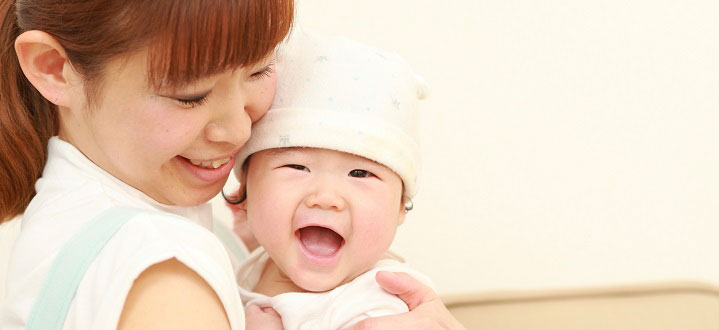Learning to read your baby's mind can help their social skills in later life
Posted on 24 August 2015
Research by our psychologists shows how important it is to be able to 'tune in' to children's thoughts and feelings

I’m lucky enough to have found something that has the potential to be beneficial for families across all social classes and income groups”
When Professor Elizabeth Meins was a PhD student studying developmental psychology, she wanted to assess the complexity of parents’ speech. To get the parents to talk, she asked them to describe their three-year-old children.
Some parents described their children in purely physical ways: “He’s very tall.” “She’s got long dark hair.” Others didn’t mention their children’s physical appearance at all and focused instead on their emotions and psychological states: “She’s got a great imagination.” “He’s really curious.”
The variety in their descriptions triggered a whole new area of research.
“We checked to see if the difference was related to the parent’s educational level or their social class: it wasn’t. It just seemed that some parents automatically thought of children in terms of what made them tick,” explains Professor Meins.
Mind-mindedness
She called this ability mind-mindedness. “Like many interesting discoveries, it was kind of accidental. If I hadn’t asked parents to describe their children to get them talking, I might never have thought about the importance of parents referring to their children’s thoughts and feelings.”
Subsequent research has shown that differences in mind-mindedness exist from the moment the child is born but parents vary widely in how well they can ‘read’ their babies’ minds.
So what kind of comment shows a parent is being mind-minded?
“If a baby could speak, it would be what the baby would say,” says Dr Fionnuala Larkin, a clinical psychologist and the leading postdoctoral researcher on Professor Meins’ team in our Department of Psychology.
Interpreting baby behaviour
“For parents, it’s about being able to ‘tune in’ to the baby’s thoughts and feelings. The parents are giving a commentary on what the baby is doing – and they are interpreting their behaviour with reference to the desires, intentions or emotions driving it.
“So if the baby points or gestures at something, the parent might say: ‘Oh, I can see you want that’ or if a toddler holds onto something, stands up and smiles at the parent, the parent might say: ‘Oh you’re really proud of yourself – you’re standing up’.”
Mind-minded parenting recognises and acknowledges emotions and feelings: “you’re excited”, “you’re happy.” It is particularly relevant for babies and toddlers, but older children and adults can also benefit from a mind-minded approach.
“It’s about validating other people’s perspectives and that can be helpful for everyone including peers, partners, and work colleagues. I’ve also had nursing staff say to me that it’s the way we should be caring for elderly people,” says Professor Meins. “If you can think about another person’s perspective, then that has the potential to improve how sensitive and sympathetic you are towards people throughout life.”
Over the last two decades, extensive international research has demonstrated that parental mind-mindedness is good for children’s development. Mind-mindedness predicts children’s language and play abilities at age two, and their understanding of other people’s thoughts and feelings throughout the preschool and early school years.
Attachment
Children with more mind-minded parents also experience fewer behavioural difficulties and are more likely to be securely attached to their parents. As a result, mind-mindedness is catching the attention of growing numbers of health professionals, teachers, social workers, children’s charities – and parents.
With the help of a Professorial Fellowship from the Economic and Social Research Council (ESRC), Professor Meins is now converting her scientific research into practical applications to boost parents’ mind-mindedness.
“As a scientist, I’ve waited until we have a good body of evidence to show that mind-mindedness is useful and helpful before taking the step to intervene and try to teach parents.”
Smartphone app
As part of York’s Mind-mindedness in Research and Practice programme, she is working with researchers on a range of projects. These include the development of an animated film and smartphone app which offer communication tips and techniques to boost mind-mindedness in new parents. A study into mind-mindedness in adoptive families is under way and the team’s work has helped shape a new NSPCC parenting programme.
The team is also working in a London mother and baby unit where mothers undergoing treatment for severe mental illness are being encouraged to think about their baby’s thoughts and feelings and become more mind-minded. Early results are very positive.
Autism
Looking to the future, they would like to develop programmes for children with communication difficulties, including autism. Professor Meins also thinks antenatal classes are a missed opportunity – and she is keen to deliver more professional training courses to key groups including midwives, health visitors, educational psychologists and social workers.
“I’m lucky enough to have found something that has the potential to be beneficial for families across all social classes and income groups. So I feel it’s my duty to make sure our academic research translates into something useful for parents and children in the real world,” says Professor Meins.
The text of this article is licensed under a Creative Commons Licence. You're free to republish it, as long as you link back to this page and credit us.

Professor Elizabeth Meins
Research focuses on the positive impact of parents’ mind-mindedness on children’s social-cognitive and social-emotional development.
Discover the details
Find out more about the Mind Mindedness in Research and Practice project at York
Listen to Professor Meins discussing mind-mindedness on BBC Radio 4's All in the Mind
Publications
A longitudinal investigation of the relationship between maternal mind-mindedness and theory of mind is published in the British Journal of Developmental Psychology
Explore more research

A research project needed to spot trees on historic ordnance survey maps, so colleagues in computer science found a solution.

We’re using gaming technology to ensure prospective teachers are fully prepared for their careers.

A low cost, high-accuracy device, could play a large part in the NHS's 'virtual wards'.
